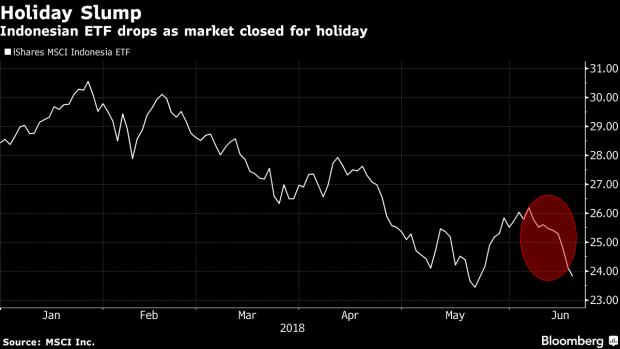Jun 19, 2018
Indonesia Traders Return From Break to Ramped-Up Trade Tensions
, Bloomberg News

(Bloomberg) -- While Indonesia’s stocks typically get a lift on the first day of trading after celebrating the end of the holy month of daytime fasting, that looks unlikely this year, if trading in the U.S.-listed ETF is any guide.
Equity traders in Indonesia were spared some of the volatility in Asian markets caused by deepening trade tensions between the U.S. and China, as the Southeast Asian country was shut for a seven-day holiday for Eid-al-Fitr celebrations.
Here’s what they have missed:
- China, U.S. threatened punishing tariffs
- Historic summit between U.S. President Donald Trump and North Korean leader Kim Jong Un
- Federal Reserve’s interest rate increase and its median forecast upgrade
- European Central Bank’s decision to halt bond purchases and keep interest rates unchanged at least through the summer of 2019
The iShares MSCI Indonesia ETF fell 6.6 percent during the Eid holiday, suggesting red screens when the cash equity market opens.
Trading in the rupiah resumes Thursday and Standard Chartered Plc expects the currency to weaken as the U.S.-China trade dispute weighs on risk appetite. “The rupiah will not remain immune in such an environment, even though Indonesia is a more domestic-oriented economy,” said Divya Devesh, a Singapore-based Asia FX strategist at Standard Chartered.
The nation’s currency ended down 0.4 percent at 13,930 per dollar on June 8 before onshore markets shut. Standard Chartered pegs 14,200 as the next key level.
Indonesia has been one of the hardest hit emerging markets in Asia because of its reliance on foreign inflows to finance its current-account deficit. The rupiah has recovered from its lowest since October 2015 as the central bank raised benchmark rates. It has gained more than 1 percent in the past month, the best performance in Asia.
And it isn’t over yet. Governor Perry Warjiyo said Monday the central bank is prepared to take action including raising interest rates at a review next week. Indonesian Finance Minister Sri Mulyani Indrawati said Tuesday the Fed and ECB had communicated its policy action well in advance and emerging markets need to adjust to this “new normal.”
But at least there will be one positive factor for stocks, according to Morgan Stanley. Strong sales figures reported during the holiday period could help lift the shares, strategist Sean Gardiner wrote in a note on June 7.
--With assistance from Abhishek Vishnoi and Harry Suhartono.
To contact the reporters on this story: Divya Balji in Singapore at dbalji1@bloomberg.net;Liau Y-Sing in Kuala Lumpur at yliau@bloomberg.net
To contact the editors responsible for this story: Chris Nagi at chrisnagi@bloomberg.net, Tom Redmond, Tomoko Yamazaki
©2018 Bloomberg L.P.


